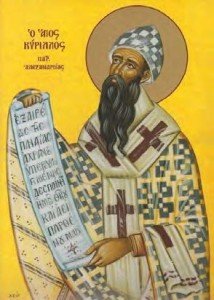In 431 the Council of Ephesus, which marked the first and decisive victory of Cyrillian Christology over Nestorianism, expressed itself in a single doctrinal decision: the Mother of Jesus is to be properly designated in the prayers of the church, in preaching, and in theological dissertations as “Bearer of God” (Theotokos) or “Mother of God” (Meter Theou). The decision was concerned with Christology: it affirmed the personal identity of Christ as the preexisting and eternal Son of God assuming human nature (not simply a single human individual). Since a mother is necessarily the mother of somebody (not of a “nature”) and since this “somebody” in Christ was God, her proper identity was indeed “Mother of God.” It was inevitable that the Christological decision of Ephesus would also add a decisive new real emphasis to Christian spirituality: a special, renewed veneration of Mary – the woman through whom the incarnation occurred; the one human person who, by free concurrence with the greatest act of God’s love, made the union of divinity and humanity possible.
Actually, the attribution of the title of Theotokos was the only doctrinal decision taken by the church concerning Mary. However, the New Testament, particularly Luke, had already proclaimed her eminent position in the “economy” of salvation. (henceforth all generations will call me blessed Luke 1:48), and, since Irenaeus and Justin, the theologians had discerned her role as the New Eve.
The very emotionalism and exuberance of Marian piety were undoubtedly expressing a spiritual discovery of the human side of the incarnation Mystery. The role of that simple woman, who conceived in her womb the new life (truly her virginity was a sign of this “newness”), was a real reminder of the humanity of Jesus himself, and it gave a new form the message that free fellowship and communion with God were the true and real expressions of authentic human nature. One of the biblical analogies of this fellowship – that of the family – was fulfilled in the particular role of Mary, as the mother not only of Christ but of all members of his Body, the Church.
Nestorianism is the doctrine that there were two separate persons, one human and one divine, in the incarnate Christ. It is named after Nestorius, patriarch of Constantinople (428–31), and was maintained by some ancient churches of the Middle East. A small Nestorian Church still exists in Iraq.

